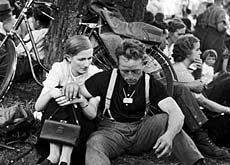
Swiss share wartime memories

Moving testimony by Swiss people of everyday life during the Second World War is the subject of a new interactive exhibition in Lausanne.
Conceived by film-maker Frédéric Gonseth, it features a series of interviews on video with 555 people from all walks of life.
Visitors to the exhibition at the historical museum can select which interviews they want to watch on television monitors, or watch excerpts from them all on a large screen in a mini auditorium.
The testimony was gathered by Gonseth over a three-year period on behalf of a Swiss association called Archimob – short for “Archives of the Mobilisation”.
The idea is that members of the public should have the chance to give their version of events, following the publication of the government-commissioned Bergier report, which made a detailed analysis of Switzerland’s wartime past.
Gonseth told swissinfo that many of those interviewed spoke of their anxieties during the war: “I particularly noted the fears that prevailed at the time, especially in 1939 and 1940. The army was badly armed and soldiers at border points knew that they could do very little to face Hitler’s army.”
Large-scale project
The Archimob project was on a huge scale. From the thousands of extracts from interviews, 64 sequences each lasting seven minutes were chosen for the exhibition.
They reflect the consequences of the outbreak of war on cultural, social and economic life in Switzerland even though it was not directly involved in hostilities. On September 1, 1939 it had reacted with a general mobilisation of 430,000 soldiers and a second one just over a year later.
Men who served in the army speak of their uncertainty about the duration of military service at a time when no one knew whether the country would be attacked.
But the exhibition also gives Swiss women a say about how their lives were affected. “Life was by no means as easy as many people think,” said museum director Laurent Golay, “even though the people did not suffer anything like as much [in Switzerland] as in countries at war.”
Food shortages
He told swissinfo: “There were food shortages, so rationing was introduced and every available piece of land was used for the cultivation of such crops as potatoes. Much more responsibility was thrust on women because so many men were away.”
When he first saw the testimony, Golay said he was particularly moved by the way many of the interviewees could not hold back their tears while recalling their experiences.
But the exhibition is by no means confined to memories of family problems. People recall the general atmosphere in a country which took in about 60,000 civilian refugees but at one point – to great controversy – closed its frontiers to more. This was strongly opposed by many Swiss.
Mention is also made by interviewees of the more than 100,000 military internees of 37 different nationalities. Mostly held in camps, they were also able to work, for example on farms and road-building schemes.
The testimony is wide-ranging and often frank. Some speak of the morale-boosting words of Switzerland’s wartime military leader, General Guisan. Others speak of their fascist sympathies during the war.
Golay says apart from the frankness, he is also impressed by the vividness of memories of events and emotions during a period some 60 years ago.
After it ends in Lausanne on April 18, the exhibition will begin a tour of Swiss towns and cities.
swissinfo, Richard Dawson in Lausanne
The exhibition at the Lausanne historical museum features hundreds of wartime testimonies, gathered over a three-year period.
It conveys the effects of war on cultural, social and economic life in Switzerland, which was not directly involved in hostilities.
On September 1, 1939 the federal government ordered a general mobilisation of 430,000 soldiers and a second one just over a year later.
Rationing was introduced and every available piece of land was used for the cultivation of crops.

In compliance with the JTI standards
More: SWI swissinfo.ch certified by the Journalism Trust Initiative




























You can find an overview of ongoing debates with our journalists here . Please join us!
If you want to start a conversation about a topic raised in this article or want to report factual errors, email us at english@swissinfo.ch.